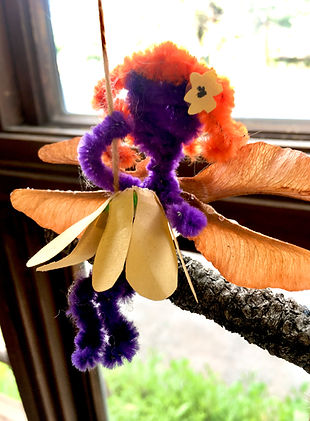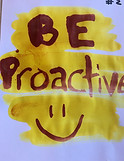Samara Day School's Program
The Samara Day School (SDS) is a private, alternative, independent, ACADEMIC-ALTERNATIVE school for students needing a small school setting and individualized education plan. Teaching kids how to "Soar With Your Strengths."
-
1st-8th grade
-
6:1 Student/teacher ratio
-
We specialize in students who are neurodivergent (ADHD, dyslexia, high-functioning autism, etc.)
-
We are NOT a behavioral school.
-
We ARE for kids struggling with their academic skills, self-esteem, and learned helplessness
-
-
Our head teachers are trained in working with kids at different grades and academic levels, utilizing various learning approaches and diagnostic teaching to help those with "learning disabilities."
-
Every day is an opportunity to help build and grow executive functioning skills vital and necessary for life success.
-
We provide multi-modal, multi-disciplinary, and individualized research-based programs that facilitate strengthening and compensatory strategies for a child’s area of need while providing opportunities for the child to discover and build upon their strengths.
The fundamental areas of learning include:
-
Academic achievement in all core areas of academics.
-
Critical thinking, reasoning, problem-solving and test-taking strategies.
-
Daily emphasis on executive functioning skills, such as organization of binder, use of a planner, utilization of resources, and proactively asking clarification questions.
-
Daily emphasis on building successful attributes such as, self-awareness, proactivity, perseverance, goal-setting, support systems, and emotional coping strategies (Based on the Marianne Frostig Center’s longitudinal study).
-
Integration of social development skills, such as, verbal and non-verbal communication, inter- and intra- personal awareness, and pragmatic language development.
-
Community/Makers' programs, such as: art, music, computer science, collaborative activities/games, and student led interests.
Based on each student’s learning profile, an Individual Instruction Plan (IIP) is designed to maximize his/her learning. This instructional plan incorporates best practices, which are based on current research, and is re-assessed on an ongoing basis. Learning comes alive through classroom and small group participation, interactive, hands-on, multi-sensory instruction and student-led ideas in a motivating environment. SDS students will be given the opportunity to achieve their fullest potential.
Community/Makers Class
This course provide an opportunity for the students to further explore
areas of strengths, interests, possible career paths, and to build
success attributes. Along with topics like art, music, computer science,
collaborative activities/games, and student-led interests. Samara Learning
Center also looks for opportunities to seek out community collaborators
based on the students' interests and areas of expertise. The Elective
Collective program will continue to grow as students offer new
suggestions and ideas based on areas of interest and community
collaborations to assist in achieving success in areas of strength and interest.
Athletics
SDS students will have physical education 4 days a week, introducing activities to students in small groups. Physical education can play a big part in the development of our students not only physically, but socially as well. Physical education includes student-led activities and ideas, accessing nature, and accessing collaborations with fellow community teachers/trainers/experts in various areas of interest. We understand that students with learning challenges can often struggle with physical challenges as well, from balance to sensory integration challenges. Physical education does not conform students to a one-size-fits-all program and respects a student's need to grow at their own pace.
Student Activities
SDS believes a good education involves much more than providing a strong academic program. Our students will learn by doing and be given opportunities to participate in various non-academic activities, which support and enrich their classroom experiences. These activities include; field trips, overnight trips, athletics, the arts, Student Council, interest clubs, school dances, and community service. These activities, combined with the academic program of SDS, will provide our students the tools to develop into well-rounded, social young people who are ready for life beyond school.
Success Attributes
An increasing amount of research is proving that IQ or S.A.T. scores are not key predictors of success in adulthood; and that personal attributes, such as perception and type of motivation are the more reliable factors to predict the likelihood of success. The Samara Day School wants to support the growth of academic skills with our students, but understands that if a child learns to persevere in the face of life struggles, proactively finds a resource to answer his/her questions, and sets high yet manageable and accessible goals, that those skills are the more likely to affect success rates leading to mature adulthood. The impact of a community using a common language of success, in explicit lessons and teachable moments, is significant. To foster the students’ future success at SDS, we base our common language on the longitudinal (over 20 years) research done at the Frostig Center in Pasadena by Goldberg, R. J., Higgins, E. L., Raskind, M. H., & Herman, K. L. (2003) Frostig is a school for students with learning disabilities that has been open for over 60 years, and during the research, they discovered that those students who developed into successful adults often had attributes in common. Frostig’s findings were formed into the “Success Attributes.”
-
Self-Awareness
-
Proactivity
-
Perseverance
-
Goal-Setting
-
Presence and Use of Support Systems
-
Emotional Coping Strategies
*http://frostig.org/our-research/frostig-published-articles/#sthash.zKfmUc5F.dpuf
Social Skills
SDS believes that students show the most growth when they are provided with a safe, predictable, and structured learning environment. Along with their academic challenges, a number of our students may have social challenges resulting from impulsivity, noticing and interpreting non-verbal cues, drawing inferences, and pragmatics. The teaching staff incorporates social skills in both direct and non-direct lessons integrating them into curriculum and teachable moments. The development of the success attribute self-awareness is essential, but many of the other attributes also come into play.
Dual Enrollment
Dual-enrollment (attending Samara in conjunction of another public or home-school program) options are available to our students at SDS. Organization of the dual enrollment is done through a team of the student’s parents/guardians, SDS administration, and the other school. Some of the factors to consider are: travel time, class schedules, credits, student benefits for dual enrollment, etc. If dual enrollment is decided to be added to the child’s education program, that student will usually attend SDS during the morning and enroll in one to three classes at an alternative school in the afternoon, but we can discuss options. One of the goals of SDS is to encourage the inclusion of students in the mainstream school setting or vocational program for as much as appropriate for that child to excel. Therefore, dual enrollment may be all the student may need from the beginning of their attendance at SDS, or a great way to help "learn and return" students from full-day attendance from SDS to the mainstream educational setting.
Homework
Teachers will assign homework based on the student’s individual level. Usually, assignments are those that can be done independently or with minimum home assistance. As the school year progresses, more challenging assignments, like long-term projects, are used as wonderful opportunities for teachers to model, encourage, and help the students build their self-awareness, proactivity, perseverance, goal-setting, awareness of/use of support systems, and emotional coping strategies. Generally, the goals for homework are:
-
Build good work and organization habits to build responsibility and independence, such as utilization of a planner and binder organization.
-
Building independent and effective study habits
-
Reinforce and practice skills taught in the classroom
-
NOT to take up the child's whole afternoon or cause strife in the family dynamics.





